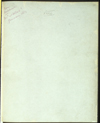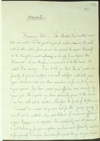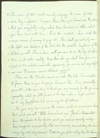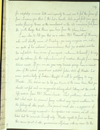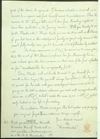Mahatma Letter No. 37
| Quick Facts | |
|---|---|
| People involved | |
| Written by: | Djual Khool |
| Received by: | A. P. Sinnett |
| Sent via: | unknown |
| Dates | |
| Written on: | unknown |
| Received on: | January, 1882 |
| Other dates: | unknown |
| Places | |
| Sent from: | unknown |
| Received at: | Allahabad, India |
| Via: | unknown |
This is Letter No. 37 in The Mahatma Letters to A. P. Sinnett, 4th chronological edition. It also corresponds to Letter No. 37 in Barker numbering. See below for Context and background.
< Prev letter chrono
Next letter chrono >
< Prev letter Barker
Next letter Barker >
Cover sheet
|
From Disinherited Received at Allahabad, January, 1882. |
NOTES: |
Page 1 transcription, image, and notes
|
Private. Honoured Sir, The Master has awaked and bids me write. To his great regret for certain reasons He will not be able until a fixed period has passed to expose Himself to the thought currents inflowing so strongly from beyond the Himavat. I am therefore, commanded to be the hand to indite His message. I am to tell you that He is "quite as friendly to you as heretofore and well satisfied with both your good intentions and even their execution so far as it lay in your power. You have proved your affection and sincerity by your zeal. The impulse you have personally given to the Cause we love, will not be checked; therefore the fruits of it (the word "reward" is avoided being used but for the "goody-goody") will not be withheld when your balance of causes and effects — your Karma is adjusted. In unselfishly and at personal risk labouring for your neighbour, you have most effectually worked for yourself. One year has wrought a great change in your heart. |
NOTES:
|
Page 2
|
The man of 1880 would scarcely recognise the man of 1881 were they confronted. Compare them, then, good friend and Brother, that you may fully realize what time has done, or rather what you have done with time. To do this meditate — alone, with the magic mirror of memory to gaze into. Thus shall you not only see the lights and shadows of the Past, but the possible brightness of the Future, as well. Thus, in time, will you come to see the Ego of aforetime in its naked reality. And thus also you shall hear from me direct at the earliest, practicable opportunity, for we are not ungrateful and even Nirvana cannot obliterate GOOD." These are the Master's words, as with His help I am enabled to frame them in your language, honoured Sir. I am personally permitted, at the same time to thank you very warmly for the genuine sympathy which you felt for me at the time when a slight accident due to my forgetfulness laid me on my bed of sickness. Though you may have read in the modern works on mesmerism how, that which we call "Will-Essence" and you "fluid" — is transmitted from the operator to his objective point, you perhaps scarcely realize how everyone is practically, albeit unconsciously, demonstrating this law every day and every moment. Nor, can you quite realize how the training |
NOTES:
|
Page 3
|
for adeptship increases both one's capacity to emit and to feel this forme of force. I assure you that I, though but a humble chela as yet, felt your good wishes flowing to me as the convalescent in the cold mountains feels from the gentle breeze that blows upon him from the plains below. I am also to tell you that in a certain Mr. Bennett of America who will shortly arrive at Bombay, you may recognise one, who, in spite of his national provincialism, that you so detest, and his too infidelistic bias, is one of our agents (unknown to himself) to carry out the scheme for the enfranchisement of Western thoughts from superstitious creeds. If you can see your way towards giving him a correct idea of the actual present and potential future state of Asiatic but more particularly of Indian thought, it will be gratifying to my Master. He desires me to let you know, at the same time, that you should not feel such an exaggerated delicacy about taking out the work left undone from Mr. Hume's hands. That gentleman chooses to do but what suits his personal fancy without any regard whatever to the feelings of other people. His present work also — a pyramid of intellectual energy misspent — his objections and reasons, are all calculated but to exonerate himself only. Master regrets to find in him the same spirit of utter, unconscious selfishness with no view to the |
NOTES: |
Page 4
|
good of the Cause he represents. If he seems interested in it at all, it is because he is opposed and finds himself roused to combativeness. Thus the answer to Mr. Terry's letter sent to him from Bombay ought to have been published in the January number. Will you kindly to see to it — Master asks? Master thinks you can do it as well as Mr. Hume if you but tried, as the metaphysical faculty in you, is only dormant but would fully develop were you but to awake it to its full action by constant use. As to our reverenced M:. he desires me to assure you that the secret of Mr. Hume's professed love for Humanity lies in, and is based upon, the chance presence in that word of the first syllable; as for "mankind" — he has no sympathy for it. Since Master will not be able to write to you himself for a month or two longer (though you will always hear of him) — He begs you to proceed for his sake with your metaphysical studies; and not to be giving up the task in despair whenever you meet with incomprehensible ideas in M:. Sahib's notes, the more so, as M:. Sahib's only hatred in his life, is for writing. In conclusion Master sends you His best wishes and praying you may not forget Him, orders me to sign myself. Your obedient servant, The "Disinherited." P.S. Should you desire to write to Him though unable to answer Himself Master will receive your letters with pleasure; you can do so through D. K. Mavalankar. "Dd". |
NOTES:
|
Context and background
Physical description of letter
The original is in the British Library, Folio 2. According to George Linton and Virginia Hanson, the letter was written "On thin creamy white paper, folded, in blue ink, in DK's script."[1] Mr. Jinarājadāsa described it differently: "The letter is written in black ink, on four pages."[2]
Publication history
This letter was published for the first time in the The Mahatma Letters to A. P. Sinnett, and later the first and fourth pages were reproduced with facsimiles in Did Madame Blavatsky Forge the Mahatma Letters?[3]
Commentary about this letter
Madame Blavatsky gave an account of Djual Khool's accident in a letter to A. P. Sinnett, dated around November 10, 1881:
The poor Disinherited is very sick. He fell down a cud & nearly broke both his legs. Had it not been for another chela with him who had time and the presence of mind of doing what was needed to arrest him in the fall he would have broken himself to pieces down an abyss of 2,800 feet – a pic! [Fr. straight down!] M. says it is a fiendish “Red Cap” who did it; who caught the boy off his guard for an instant & positively took advantage of it in a wink; that he roamed for weeks around the house where there is no adept now but only three chelas & a woman. Of course the D. will soon be better, but it is one more proof that even a chela and of the 1st degree can be off his guard sometimes & that accidents will happen in the best regulated families.[4]
Another reference to an injury of The Disinherited is found in Mahatma Letter 85b on page 3:
Djual Khool can easily break his nose to blood, by running in the dark against a beam, as he did the other night – (just because instead of throwing a "film" he had foolishly paralyzed all his outer senses while talking to and with a distant friend)[5]
However, that account of the bleeding nose was written in mid-November, 1882, so it is not likely to be the event cited in the current letter, and would hardly have "laid me on my bed of sickness."
Notes
- ↑ George E. Linton and Virginia Hanson, eds., Readers Guide to The Mahatma Letters to A. P. Sinnett (Adyar, Chennai, India: Theosophical Publishing House, 1972), 87.
- ↑ C. Jinarājadāsa, Did Madame Blavatsky Forge the Mahatma Letters? (Adyar, Madras, India: Theosophical Publishing House, 1934), 47.
- ↑ C. Jinarājadāsa, Did Madame Blavatsky Forge the Mahatma Letters? (Adyar, Madras, India: Theosophical Publishing House, 1934), 48-49.
- ↑ H. P. Blavatsky letter to A. P. Sinnett. Date about November 10, 1881. Published in The Letters of H. P. Blavatsky to A. P. Sinnett by A. T. Barker in 1925. It will also appear with additional notes in Volume II of HPB's Collected Letters. Thanks to researcher Anton Diachenko for pointing out this reference.
- ↑ Mahatma Letter 85b, page 3.
